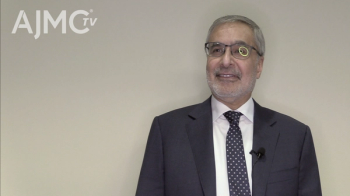
Pembrolizumab Associated With Increased Overall Survival in Patients With Urothelial Cancer
There is a greater overall survival benefit for patients with recurrent urothelial cancer being treated with pembrolizumab versus chemotherapy, according to long-term results of the KEYNOTE-045 trial.
There is greater overall survival (OS) benefit for patients with recurrent urothelial cancer being treated with pembrolizumab versus chemotherapy, according to long-term results of a randomized trial.
During the 2018 Genitourinary Cancers Symposium, Joaquim Bellmunt, MD, PhD, of the Dana Farber Institute, presented results from a median follow-up of 27.7 months of the KEYNOTE-045 trial, which compared pembrolizumab versus the investigator’s choice of paclitaxel, docetaxel, or vinflunine in recurrent, advanced urothelial cancer as second-line treatment.
Between November 2014 and November 2015, 542 patients were enrolled in the trial. Participants were randomized 1:1 to the immunotherapy arm to receive 200 mg of pembrolizumab intravenously every 3 weeks, or to the chemotherapy arm to receive 1 of the following: 175 mg/m2 of paclitaxel every 3 weeks, 75 mg/m2 of docetaxel every 3 weeks, or 320 mg/m2 of vinflunin every 3 weeks.
The dual primary endpoints were OS and progression-free survival (PFS). Key secondary endpoints were objective response rate (ORR), duration of response, and safety. Tumors were assessed at week 9 and every 6 weeks following for a 1-year duration, and then were assessed every 12 weeks thereafter. PD-L1 status was also obtained; it was considered positive when more than 10% of tumor and immune cells showed PD-L1 expression.
In the pembrolizumab arm, 26 patients were able to complete 2 years of therapy, while none in the chemotherapy arm were able to do so. The researchers also saw 10 complete responses in the pembrolizumab arm, compared with 1 in the chemotherapy arm.
Following 27.7 months of follow-up, the median OS was 10.3 months for participants treated with pembrolizumab versus 7.3 months for participants treated with chemotherapy. The 12-month OS was 44.4% for the pembrolizumab arm compared to 29.8% in the chemotherapy arm; 24-month OS was almost doubled in the pembrolizumab arm, at 27% (compared to 14.3% in the chemotherapy arm).
At 24 months, 60.6% of participants in the chemotherapy arm received an immunotherapeutic agent, including those who received pembrolizumab as part of the crossover, according to Bellmunt.
Although there were no significant differences in PFS at 14 or 27.7 months of follow-up, the authors did see that the proportion of participants that remained progression free was greater in the pembrolizumab arm at 12 months (18.4% versus 9.5%) and at 24 months (12.5% versus 2.5%).
ORR was almost double in the pembrolizumab arm (21.1% versus 11%), and the pembrolizumab arm saw fewer adverse events compared with the chemotherapy arm.
“Pembrolizumab is the first immunotherapy to demonstrate superior survival over chemotherapy in patients with advanced urothelial carcinoma after failure of platinum-based therapy,” concluded Bellmunt. “This is level 1 evidence that supports the use of pembrolizumab as a standard of care for this patient population.”
Newsletter
Stay ahead of policy, cost, and value—subscribe to AJMC for expert insights at the intersection of clinical care and health economics.
















